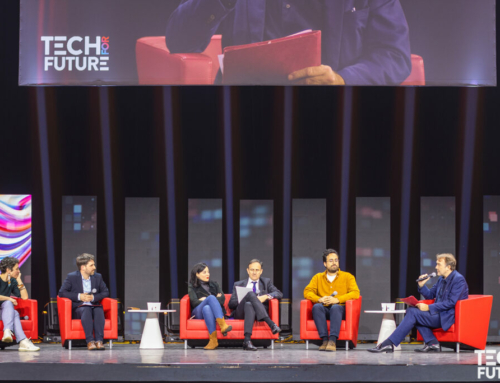Artificial intelligence is often in the news. Even more so since the acceleration of the digital transformation we are experiencing, where Big Data is the new queen of an industry that is still a little unclear in the collective mind, that of the use of personal data. In every field where artificial intelligence is present, especially in Europe, it comes up against the question of ethics. But before going into more detail, what exactly is artificial intelligence ? Where do we stand in this technological advance, and what could be its uses in higher education ?
AI, or artificial intelligence, covers a wide spectrum of technologies we use every day. It is defined by Larousse as “all the theories and techniques used to create machines capable of simulating human intelligence”. These are evolutionary algorithms with the ability to learn by interacting with external data. This technology is often presented as covering two concepts: “strong intelligence”, referring to AIs capable of developing intelligence, emotions and possibly consciousness, and “weak intelligence”, which from a more pragmatic point of view, has as its main objective the creation of increasingly autonomous systems. It’s the latter that we find most often in our environments. It should be noted, however, that the former remains in the realm of theory for the time being, and that the definition of consciousness for an AI does not enjoy consensus in the scientific community.
Artificial intelligence is defined as “the construction of computer programs that perform tasks that are, for the moment, more satisfactorily accomplished by human beings because they require high-level mental processes such as perceptual learning, memory organization and critical reasoning”, according to Marvin Lee Minsky, recognized as one of the creators of artificial intelligence.
These technologies have rapidly spawned tools for analyzing people’s habits and behaviors, and then responding in the most personalized and precise way possible. This personalization of the user experience, in all fields, has created numerous advantages. For example, the ability to respond to more advanced needs, with applications or solutions capable of recommending playlists or films we might like.
Artificial intelligences are everywhere, often without us even realizing it. In our computers, telephones, stores, even in our cars ! All with the intention of improving our daily lives in a personalized way.
What if artificial intelligence were to take its place on university campuses ?
One of the main advantages of artificial intelligence is that it enables us to understand students’ needs by identifying them more quickly. Thanks to the collection and processing of behavioral data, it is possible to identify an individual’s conscious and unconscious behavior, and thus understand them not by the information they might give us verbally or in writing, but by capturing their actions, which can sometimes be more revealing. As a result, these intelligences enable universities to identify students’ interests and characteristics in a targeted way. This data can then be used to provide optimized and tailored services for students’ learning and university life. Georgia State University, for example, has succeeded in increasing student attendance at the start of the academic year, by using intelligent text messages capable of dialoguing with and answering questions from prospective students !
On a more personal level, AI can enhance the student experience. By analyzing its data, the intelligence can adapt the form of content, subjects and tools available to the learner, so that he or she benefits from customized, personalized learning. In this way, learners can evolve according to their interests, pace and desires. This personalization brings comfort and flexibility to learning. Can you imagine applying personalization technologies such as those used by your favorite streaming platforms to an educational digital library, enabling you to access the form of content that suits you best, on subjects related to your courses or your centers of interest? In a world where access to information is democratized, it’s easy to get lost in overabundant streams! These technologies could simplify this search for information, by targeting the best for each individual.
The presence of AI on a campus also creates more engagement and interaction between players in the university ecosystem. For example, certain mobile applications can be used to put students in touch with each other, but also to get closer to lecturers, enabling everyone to communicate more fluidly! In the same way, artificial intelligence can improve the work of teaching and administrative staff. They can facilitate many processes by automating certain tasks that are sometimes repetitive and time-consuming, such as answering students’ administrative or logistical questions, which could be handled by chatbot technology, able to direct them and respond to their needs! This would enable teams to devote more time to tasks that require real human reflection!
Georgia Tech is a well-known example of this. As part of his master’s course on AI, Professor Ashok Goel replaced one of his teaching assistants with a virtual assistant: Jill Watson (based on IBM’s Watson technology!). In the course of one semester, Jill was asked more than 10,000 questions in the messaging area, without any of the students noticing that she wasn’t human!
Finally, AI is also a way of making students more autonomous and proactive in their learning projects and goals, giving them the means to succeed. This is what chatbots such as HelloCharly, developed by a French EdTech, achieve by guiding students according to their professional needs. These technologies, which can be interacted with and subsequently guided, create an easy, engaging and, above all, in tune with students’ habits of accessing information.
Applicable to different stages of their research, artificial intelligence is enabling access to knowledge to evolve in a whole new way, with the emergence of free, online applications or learning solutions that encourage students to develop skills that will be useful to them professionally. These technologies, when equipped with artificial intelligence, have the ability to target learning and personalize users’ learning paths according to their interactions!
For example, Babbel, a language-learning application, has integrated auditory recognition technology, capable of determining quite precisely whether the user has pronounced the word in the right way. Numerous applications of this kind are developing with a highly adapted and personalized course, and also gamified, which greatly increases engagement!
Our robots talk about gamification in this article :
https://www.simoneetlesrobots.com/la-gamification-des-apprentissages-une-perspective-engageante/
Where do we stand today?
Artificial intelligence is increasingly present today. Some universities have deployed AI-enabled software solutions, chatbots or mobile applications. However, technological advances allow us to go even further and advance in the creation of engaging and immersive environments. By using gamification codes, we can create learning scenarios that evolve according to the needs and learning capacities of each individual. We like immersive technologies at Simone et les Robots because they make students actors in their learning, and have a major impact on their retention and satisfaction.
If you’d like to (re)read our article on the subject, click here:
Today, it’s clear that we need to move towards a more autonomous education, one that is more involved and more connected to the technologies present in our environment, in order to best prepare future generations to evolve in tomorrow’s world!
And if we look beyond our borders, India is one of the countries that has understood this and is one of the most advanced in terms of technology in education. Today, India is betting on artificial intelligence, which it believes can transform the EdTech market.
In 2018, the French government launched its AIForHumanity investment program in partnership with Inria, with the aim of making France an AI expert, particularly following the report by mathematician and MP Cédric Villani.
Artificial intelligence is often the stuff of fantasies, but we’re a long way from an intelligence capable of personal reflection, or of taking the initiative out of common sense. It will be capable of acting and reacting in a field limited to the one it learns during its training, preventing it from integrating essential notions such as taking account of an environment that requires multifactorial analysis.
“These machines are dramatically simple (…) today, we’re making very standardized systems, we’re playing sorcerer’s apprentice”, Laurence Devillers, professor of artificial intelligence at Sorbonne université, told RFI’s La Matinale on March 8, 2021.
As you can see, the domination of robots thanks to artificial intelligence isn’t just around the corner, as Simone’s Robots have confirmed… #ornot 😉
https://www.financialexpress.com/brandwagon/how-the-adoption-of-ai-has-the-potential-to-transform-the-edtech-industry-in-india/2216168/






